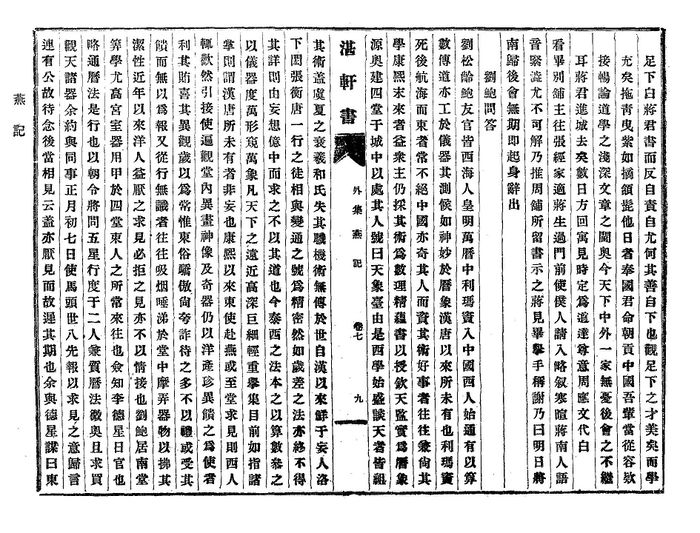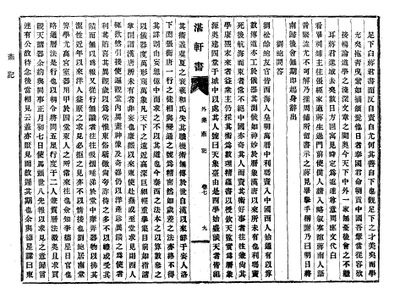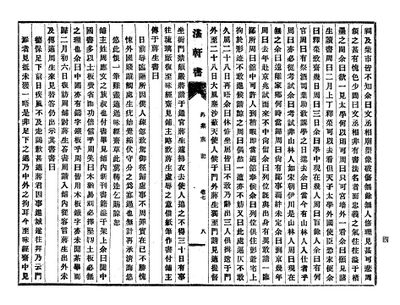"(Translation) 劉鮑問答"의 두 판 사이의 차이
2bthebridge (토론 | 기여) |
2bthebridge (토론 | 기여) 잔글 |
||
| 30번째 줄: | 30번째 줄: | ||
(translation) | (translation) | ||
| − | Liu Songling 劉松齡 and Bao Youguan 鮑友官 are all from Western Sea. During the reign of the Emperor Manli(萬曆 r.1573-1619) of Ming Dynasty, Li Madou 利瑪竇 came to China. Thereby exchanges with the Westerners began. They[The Westerners] propagate their teachings by the means of mathematics, they are also skilled in astronomical devices. Their astronomical and meteorological observations are miraculously accurate. As for the delicacy of their calendar and meteorology, there was nothing like that since the era of Han and Tang dynasties. After the death of Li Madou, those who crossed the sea toward East never stopped coming. China also highly regarded them and utilized their skills. Those who are fond of meddling / Curiosity-mongers often revered their learning. In the later period of Emperor Kangxi [康煕, r.1662-1722], even more westerners came to China. The Emperor collected their skills and composed the book Shuli jingyun [數理精蘊, Essence of Numbers and their Principles | + | Liu Songling 劉松齡 and Bao Youguan 鮑友官 are all from Western Sea. During the reign of the Emperor Manli(萬曆 r.1573-1619) of Ming Dynasty, Li Madou 利瑪竇 came to China. Thereby exchanges with the Westerners began. They[The Westerners] propagate their teachings by the means of mathematics, they are also skilled in astronomical devices. Their astronomical and meteorological observations are miraculously accurate. As for the delicacy of their calendar and meteorology, there was nothing like that since the era of Han and Tang dynasties. After the death of Li Madou, those who crossed the sea toward East never stopped coming. China also highly regarded them and utilized their skills. Those who are fond of meddling / Curiosity-mongers often revered their learning. In the later period of Emperor Kangxi [康煕, r.1662-1722], even more westerners came to China. The Emperor collected their skills and composed the book ''Shuli jingyun'' [數理精蘊, Essence of Numbers and their Principles] to pass it to the Imperial Board of Astronomy 欽天監. Indeed, this book became profound basis of calendar and meteorology. |
|- | |- | ||
| [[File:유포문답2.jpg |border|유포문답2|400px]] | | [[File:유포문답2.jpg |border|유포문답2|400px]] | ||
2018년 7월 17일 (화) 22:30 판
| Primary Source | ||
|---|---|---|
 |
Title | |
| English | ||
| Chinese | 劉鮑問答 | |
| Korean(RR) | 유포문답 | |
| Text Details | ||
| Genre | ||
| Type | ||
| Author(s) | 洪大容 | |
| Year | ||
| Source | ||
| Key Concepts | ||
| Translation Info | ||
| Translator(s) | Participants of 2018 Summer Hanmun Workshop (Advanced Translation Group) | |
| Editor(s) | Goeun Lee | |
| Year | 2018 | |
Introduction
"Yupo mundap" is a short script from Hong Daeyong [MR:Hong Taeyong]'s anthology Damheonjip [MR: Tamhǒnjip] included in his records on his visits to Beijing. It describes his encounter with two Jesuit missionaries in the Southern Church in Beijing, his observation on western architecture and products. This travelogue reveals Hong's practical attitude as a silhak scholar who actively advocated new learnings from Qing China, contrary to the existing notion of revering Ming and rejecting Qing 崇明排淸. Therefore he paid a visit to Beijing to broaden his horizon by observing new books, stores, customs and famous sites influenced by westerners in Beijing. He made a personal interpretations and comments without relying on classical allusion, and this reveals his character.
Original Script
- Discussion Questions:

